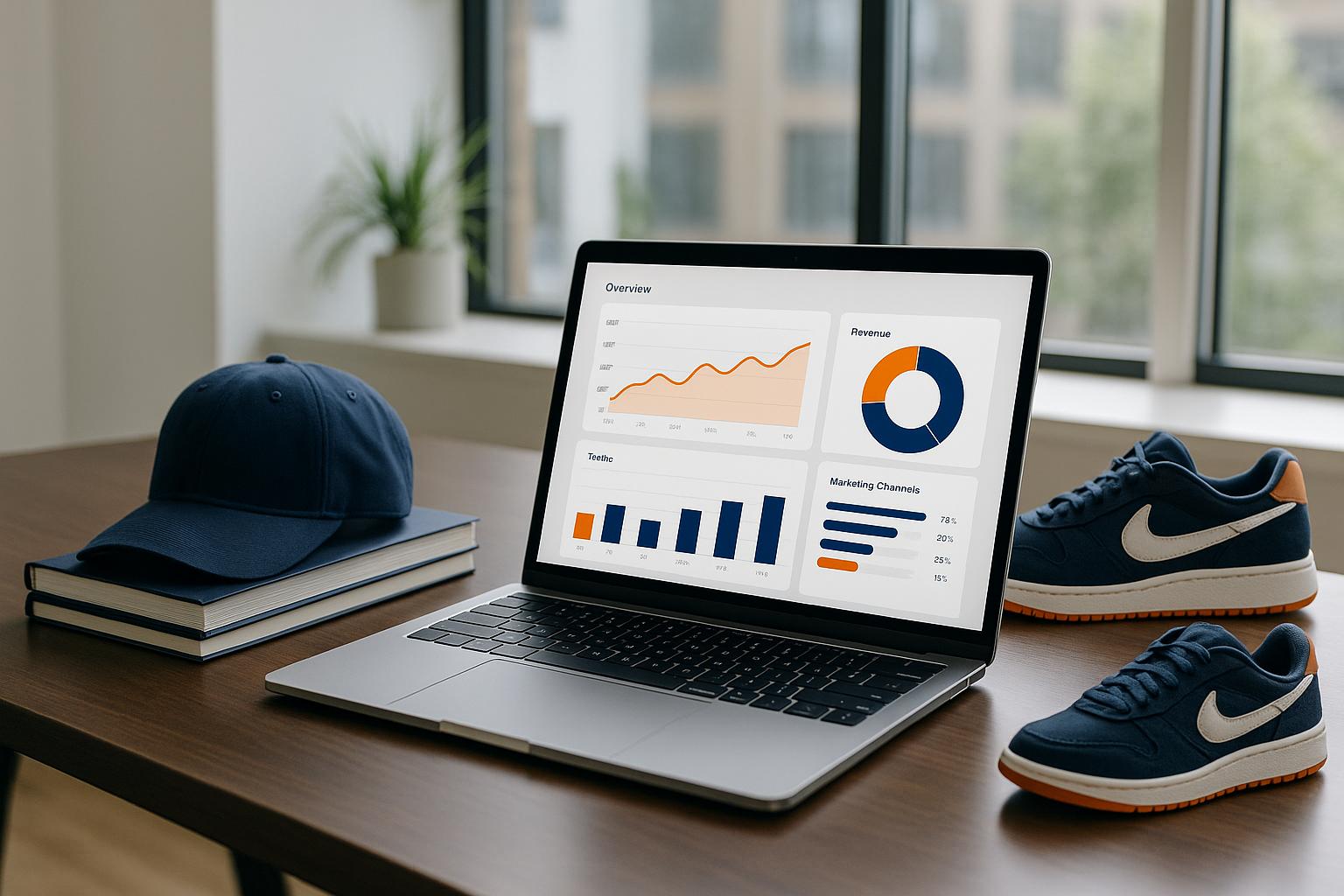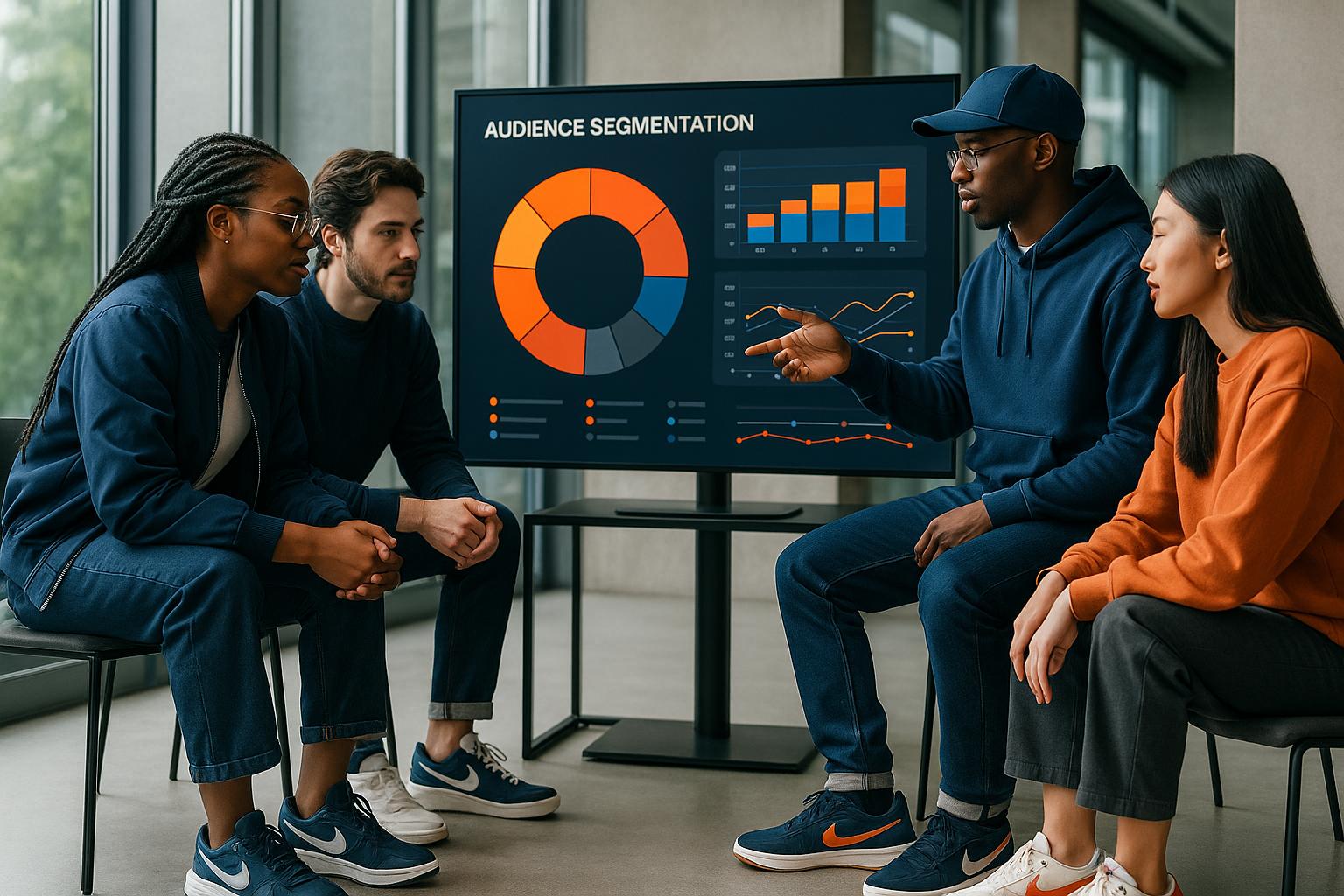AI and human collaboration are reshaping marketing in 2025. AI handles repetitive tasks, data analysis, and personalization, while humans bring emotional intelligence, creativity, and strategic thinking. Together, they improve efficiency and create campaigns that connect with audiences.
Key Takeaways:
- AI’s Role: Automates tasks like email segmentation, content creation, and campaign optimization. Boosts efficiency (83% of marketers) and drives results (e.g., 35% higher purchase frequency).
- Human Strengths: Emotional understanding, storytelling, and relationship management. Essential for building trust and crafting meaningful connections.
- Combined Impact: Teams using AI for data-heavy tasks free up humans to focus on high-value activities like strategy and customer engagement.
- Challenges: AI struggles with creativity, ethical judgment, and cultural nuances. Human oversight is critical to avoid bias and ensure brand alignment.
Quick Comparison:
| Task | AI Strengths | Human Strengths | Best Approach |
|---|---|---|---|
| Data Analysis | Processes large datasets quickly | Strategic interpretation | AI analyzes; humans decide |
| Content Creation | Generates drafts, optimizes content | Emotional connection, storytelling | AI writes; humans refine |
| Customer Segmentation | Behavioral analysis, predictive models | Empathy, understanding motivations | AI identifies; humans personalize |
| Campaign Optimization | Real-time adjustments | Strategic pivots | AI handles technical; humans guide |
Marketers, This Is How You Don’t Get Replaced by AI (Human Edge Framework)
What AI Can Do in Marketing Teams
AI is transforming the way marketing teams operate by taking over repetitive tasks and enabling marketers to focus on strategic initiatives. It thrives in areas that demand speed, scalability, and data-driven insights, allowing teams to work smarter, not harder.
AI Advantages
One of AI’s standout abilities is automating routine tasks while processing vast amounts of data in real time. Tasks like segmenting email lists or analyzing campaign performance, which might take hours for a human, are completed by AI in mere minutes – and with greater precision.
Data analysis is at the heart of successful marketing, and AI is a game-changer here. It can comb through customer data, website analytics, and campaign metrics to uncover patterns that would be nearly impossible for humans to detect. This means marketers can make faster, more confident decisions grounded in data.
AI also excels at ongoing performance monitoring. It can adjust ad spending, optimize email delivery timing, and personalize website experiences instantly, ensuring campaigns stay on track.
The numbers speak for themselves: 83% of marketers say AI allows them to focus on more creative or strategic tasks, 93% use AI to accelerate content creation, and 65% report better SEO outcomes with AI tools in their arsenal.
"AI is changing the game for marketers at the moment. If you aren’t adopting AI in your day-to-day processes, the risk of falling behind your competitors becomes greater and greater." – Dan Shaffer, Director, SEO.com
These advantages extend across nearly every marketing channel, as illustrated below.
Marketing Applications
AI’s impact spans a wide range of marketing functions. Here’s a look at some key areas where it delivers results:
| Task | AI Contribution |
|---|---|
| Content Creation | Develops engaging copy for blogs, product descriptions, and ads |
| Email Marketing | Optimizes subject lines and automates email sequences |
| Paid Advertising | Powers programmatic ad buying and predictive analytics for campaigns |
| Social Media Marketing | Predicts viral trends and enhances engagement strategies |
| SEO | Improves keyword targeting, site audits, and content strategy |
| Customer Service | Drives chatbots for real-time support and tailored recommendations |
| Data Analysis | Processes large datasets to uncover actionable insights |
| Workflow Automation | Manages tasks like data entry and reporting |
AI’s predictive capabilities are particularly valuable. By analyzing historical data, it can forecast customer behavior, such as who is most likely to make a purchase, the best timing for engagement, and which products will resonate most. This allows marketing teams to allocate resources effectively and tailor campaigns for maximum impact.
Take Coca-Cola as an example. In 2020, the company used AI-driven sentiment analysis to refine its "Share a Coke" campaign. By tracking social media reactions, they identified which names resonated in different regions, boosting U.S. sales by 2% and generating over 500,000 user-shared photos of personalized Coke bottles. Similarly, during the 2018 FIFA World Cup, Coca-Cola leveraged AI to optimize digital ads in real time based on consumer engagement, resulting in over 1.5 billion impressions.
AI also excels at personalizing content at scale. In one case from March 2023, a company saw a 40% increase in conversion rates within three months by using AI to retarget website visitors with tailored ads.
AI Limitations
While AI offers undeniable advantages, it has its limitations – especially in areas like creativity and emotional intelligence, where human insight remains irreplaceable.
"Where we see AI as having limitations are in the obvious areas: emotions, feelings, subjective thinking. Humans are unique in their ability to feel in a very complex way and translate those feelings into emotional connections." – Or Shani, CEO, Albert
AI’s effectiveness is heavily dependent on high-quality data. Without rich datasets, its capabilities diminish significantly. As Adam Long, VP of Product Management at Automated Insights, puts it: "On a practical level, artificial intelligence is limited only by the availability of data. Because there’s a direct relationship between the richness of data and the capability of an artificial intelligence application, data becomes the key to an AI system".
Another challenge lies in cultural nuances and context. AI may miss subtle references or industry-specific insights that human marketers grasp intuitively. This can result in campaigns that feel out of touch or fail to resonate with the target audience.
AI also struggles with achieving full automation. Guillaume Decugis, CEO of Linkfluence, explains: "Building systems where AI replaces humans 100% is really, really hard". This highlights the ongoing need for human oversight and intervention.
Concerns about bias and accuracy further limit AI’s effectiveness. Dyani Marvel, VP of Marketing Strategy at Wondr Nation, warns: "Utilizing generative AI has risks and challenges… There are biases built into these tools". Marketing teams must carefully review AI-generated content to ensure it aligns with their brand and avoids potential pitfalls.
Finally, over-reliance on AI can lead to generic, uninspired content that lacks the originality and emotional resonance human creativity brings to the table. Striking the right balance between AI and human input is essential for effective marketing campaigns.
Human Advantages in Marketing Teams
While AI takes care of data processing and routine tasks, human marketers bring a creative and ethical touch that turns campaigns into meaningful experiences. AI might be great at crunching numbers and automating workflows, but it’s the human element that adds depth, emotion, and connection to marketing efforts. These qualities – creativity, ethical decision-making, and relationship-building – are what make campaigns impactful and memorable.
Creative Work and Storytelling
Human creativity stems from personal experiences and emotions, allowing marketers to craft stories and ideas that truly connect with audiences. Unlike AI, people can push creative boundaries, adding humor, empathy, and a conversational tone that makes each audience feel seen and understood. This creativity also shines in the development of interactive content like quizzes, polls, and gamified experiences, which engage audiences on a deeper level. Additionally, human marketers excel at building a brand’s identity, ensuring it evolves with trends and respects cultural nuances.
Ethics and Emotional Understanding
Modern marketing often involves navigating complex ethical landscapes, and this is where human judgment becomes indispensable. Humans can evaluate content for its ethical and emotional impact, spotting potential issues that an algorithm might miss. Whether it’s adjusting messaging to avoid insensitivity or tailoring the tone to suit the audience, human marketers bring a thoughtful approach. They understand psychology and know when to use seriousness, humor, or empathy to build trust and foster authenticity.
Client Management and Planning
Human marketers also excel at managing client relationships, a skill that relies heavily on trust and communication. This is particularly important when you consider that 80% of consumers see trust as a key factor in their buying decisions, yet only 34% actually trust the brands they purchase from. Marketers adapt their communication style to fit individual clients – some prefer straight facts, while others appreciate a more conversational approach. The secret is flexibility: instead of sticking to a rigid script, marketers enter conversations with a clear goal and adjust as needed to learn and connect effectively.
Consumers want to feel heard and valued. In fact, 63% say companies should listen more to their feedback, and 62% believe brands need to show they care. When customers feel genuinely cared for, 60% are more likely to buy more. By actively listening and understanding client goals, human marketers build trust and mutual respect. They also strengthen long-term relationships by maintaining regular communication, which often leads to repeat business. Supporting this, data shows that customers who rate an experience 5 out of 5 stars are more than twice as likely to return.
sbb-itb-d6d4d8b
Working Together: AI and Human Teamwork
Blending AI’s precision with human creativity is becoming a cornerstone of modern digital marketing. When AI and human marketers join forces, they can achieve results far beyond what either could accomplish alone. Instead of competing, they complement one another – AI excels at data-driven tasks and automation, while humans bring strategic thinking and creativity to craft memorable campaigns.
How to Combine AI and Human Work
The best marketing teams use AI to enhance, not replace, human efforts. Start by identifying repetitive or time-consuming tasks that AI can handle, freeing your team to focus on strategy and innovation.
For instance, consider launching a pilot project like using AI-powered lead scoring to pinpoint high-value prospects for personalized outreach. This lets you evaluate AI’s impact without overhauling your entire process.
AI can also flag inefficiencies – such as overspending, underperforming segments, or low ad returns – cutting reporting time by 20%. This time savings allows marketers to shift their attention to strategic planning and building stronger client relationships, rather than getting bogged down in manual data analysis.
To make the most of AI, ensure your data is accurate and reliable – AI’s output is only as good as its input. Always review AI-generated content to ensure it aligns with your brand’s tone and messaging.
Opt for AI platforms that integrate seamlessly with your existing tools and offer strong API capabilities. This avoids creating data silos and ensures your team can access AI insights within familiar workflows.
A great example of this synergy is Coca-Cola’s 2024 initiative, "Create Real Magic." This platform combined OpenAI’s GPT-4 and DALL-E technologies, empowering digital artists worldwide to reimagine Coca-Cola’s iconic elements. The result? A wave of fresh, original artwork that showed how AI can speed up content creation while maintaining brand consistency across diverse markets.
This balance of roles – AI for efficiency and humans for creativity – is reflected in the way tasks are divided between them.
Comparison Table: AI vs. Human Roles
| Marketing Task | AI Strengths | Human Strengths | Best Approach |
|---|---|---|---|
| Data Analysis | Real-time processing, pattern recognition, large dataset handling | Strategic interpretation, understanding context | AI processes data; humans interpret insights and make strategic decisions |
| Content Creation | High-volume generation, A/B testing, optimization | Creative storytelling, emotional connection, brand voice | AI drafts content; humans refine and add creative flair |
| Customer Segmentation | Automated clustering, behavioral analysis, predictive modeling | Empathy, understanding motivations, cultural nuances | AI identifies segments; humans craft personas and messaging strategies |
| Campaign Optimization | Automated bidding, real-time adjustments, performance tracking | Strategic pivots, creative problem-solving, relationship management | AI manages technical adjustments; humans guide overall campaign strategy |
| Lead Scoring | Behavioral tracking, predictive analytics, scoring algorithms | Building relationships, deal closing | AI prioritizes leads; humans handle personalized outreach and nurturing |
Training for Future Changes
As marketing evolves, so should your team. Investing in continuous learning is key to staying ahead of new AI capabilities. Encourage a mindset of experimentation, where team members feel empowered to try new tools and share their findings.
Develop training programs that blend technical AI skills with the uniquely human abilities that become even more valuable as AI takes over routine tasks. Teach your team how to effectively prompt AI, evaluate its outputs, and know when human judgment is essential.
Start with AI tools that address your most pressing needs and can grow with your business. For example, platforms for AI-driven email optimization, automated social media scheduling, or predictive analytics can deliver quick wins while building your team’s confidence in using AI.
Regular hands-on experience with AI tools not only increases ROI but also ensures your team adapts quickly to new features. Monitoring AI performance daily and experimenting with its capabilities helps identify what resonates most with your audience.
With 51% of marketers already using AI and another 27% planning to adopt it, staying ahead is critical. The global AI marketing market is projected to hit $107.5 billion by 2025, making AI literacy a must-have for staying competitive.
Conclusion: Finding the Right AI and Human Balance
Success in marketing comes from blending the strengths of AI and human talent to achieve results that neither could accomplish alone. Companies that strike this balance are already reaping the rewards, with some reporting productivity boosts of up to 40% in specific areas by automating repetitive tasks.
Main Points
AI shines when it comes to processing large amounts of data and handling routine tasks. On the other hand, humans bring creativity, emotional understanding, and strategic thinking to the table. As Abhishek Gandotra, a Strategic Decision-Making Expert, puts it:
"The future of marketing lies not in choosing between human creativity and AI analytical power, but in learning how to combine them effectively for maximum impact."
To create a winning strategy, assign AI to manage short-term optimizations while allowing humans to focus on long-term vision and strategy. For instance, AI-driven notifications outperform manually scheduled ones by 39%, and apps using AI-powered customer journeys see a 13.6% higher average 30-day retention rate. By integrating AI’s capabilities with human insight, businesses can achieve greater efficiency and build stronger connections with their audience.
Ethical considerations and transparency are vital in this process. Silverback Strategies emphasizes:
"AI-driven marketing strategies must prioritize transparency to the consumer by ensuring they are clearly informed about how their personal data is being used and obtain consent before any data is collected."
The most effective marketing strategies balance AI’s capabilities with the human touch. Building a culture where AI and humans complement one another ensures teams can adapt as technology evolves.
Getting Professional Help
Successfully combining AI and human efforts requires careful planning and expert guidance. Professional consultants can help you implement AI-driven marketing systems, develop strategies, and train your team to work seamlessly within this framework. For example, JeffLizik.com offers digital marketing consulting services, including 12-month actionable marketing plans and tailored AI system implementations. These experts can help you avoid common mistakes, establish clear roles for AI and humans, and create workflows that maximize productivity and creativity.
A thoughtful approach is key. Partnering with professionals who understand the strengths of both human talent and AI systems can help your team thrive. With the right guidance, you can harness AI’s data-driven insights while maintaining the creativity and emotional intelligence that resonate with customers.
FAQs
How can marketing teams strike the right balance between AI tools and human creativity to create successful campaigns?
Marketing teams can strike the right balance by leveraging AI tools for tasks such as data analysis, audience segmentation, and performance forecasting. These tools help simplify repetitive tasks and uncover insights that save time while boosting efficiency.
On the flip side, human creativity is key to crafting meaningful stories, forming emotional connections, and ensuring campaigns truly resonate with audiences. When AI’s accuracy is paired with human intuition, teams can produce campaigns that are both driven by data and emotionally impactful, paving the way for better results.
What ethical challenges can arise when using AI in marketing, and how can teams stay aligned with their brand values?
Using AI in marketing comes with its own set of challenges, especially when it comes to data privacy, algorithmic bias, and transparency. These issues can directly impact how much consumers trust your brand. To address this, it’s crucial for teams to adopt responsible practices. Be upfront about how customer data is gathered and used, provide clear opt-out options, and follow ethical AI principles like fairness and inclusivity.
It’s also important to ensure that your AI tools align with your brand’s mission and tone. Regularly review AI-generated content and campaigns to make sure they stay consistent with your brand identity and avoid any unintended messages. Striking a thoughtful balance between AI’s efficiency and human oversight is key to maintaining both ethical standards and the integrity of your brand.
How can marketing teams adapt to the growing use of AI technologies to stay competitive?
To keep up as AI becomes a bigger part of marketing, teams should start by weaving AI into specific areas like automation, data analysis, and customer insights. Starting with smaller projects gives teams the chance to experiment, learn, and make adjustments before rolling out AI solutions on a larger scale.
Another key step is training and upskilling team members. This ensures everyone knows how to use AI tools effectively and align them with the team’s overall goals. Partnering with reliable AI providers can also simplify the integration process and give teams access to cutting-edge tools, making it easier to adapt to changing consumer habits and industry shifts.
When human creativity meets AI’s analytical abilities, marketing teams can deliver more personalized, data-driven campaigns. The result? Better efficiency and a stronger position in an increasingly competitive market.









